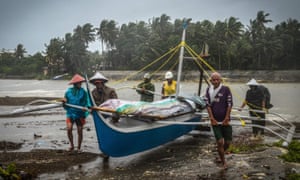Typhoon Phanfone has pummelled the central Philippines on Christmas Day, bringing a wet and miserable holiday season to millions. Thousands were stranded at shuttered ports or evacuation centres while others sheltered in rain-soaked homes as Phanfone crossed from one island to another for the second day.
The typhoon toppled houses and trees and blacked out cities in the Philippines’ most storm-prone region. More than 10,000 people spent the night in schools, gyms and government buildings hastily converted into evacuation centres as the typhoon made landfall on Tuesday, civil defence officials said.
“It was frightening. The glass windows shattered and we took cover by the stairs,” said Ailyn Metran after she and her four-year-old child spent the night at the local state weather service office where her husband worked. The family returned to their home in Tacloban city on Wednesday to find their two dogs safe but the floor was covered in mud and a fallen tree on their house.
More islands lay in Phanfone’s projected path towards the South China Sea.
More than 25,000 people trying to get home for the traditional Christmas Eve midnight dinner remained stranded at ports on Christmas Day with ferry services closed, the coast guard said. Scores of flights to the region also remained cancelled, though the capital Manila, on the northern edge, was being spared.
Phanfone ravaged the north of the island of Cebu overnight on Tuesday, and residents decamped from evacuation centres only to find their homes damaged, civil defence official Allen Froilan Cabaron told AFP.
“They were safer at the evacuation centres. At least they were able to eat the Christmas Eve meal there, even if only tinned fish and instant noodles were available,” Cabaron said.
“Obviously, they were unable to celebrate Christmas properly because some spent the night at evacuation centres,” rescue official Cecille Bedonia said from Iloilo city.
At the western island resort of Coron, the beaches emptied and boat tours were suspended as Western tourists stayed in their rooms to await the typhoon onslaught later on Thursday.
“Many of the tourist establishments here are closed, and some of our guests failed to arrive because their flights were cancelled,” hotel receptionist Nina Edanosaid. “We’re not scared, but the ambience here is generally gloomy.”
The Philippines is the first major landmass facing the Pacific cyclone belt and gets hit by an average of 20 storms and typhoons each year. A study by the Manila-based Asian Development Bank found the most frequent storms cut 1% from the Philippine economic output and the stronger ones by nearly 3%.
With Agence France-Presse

